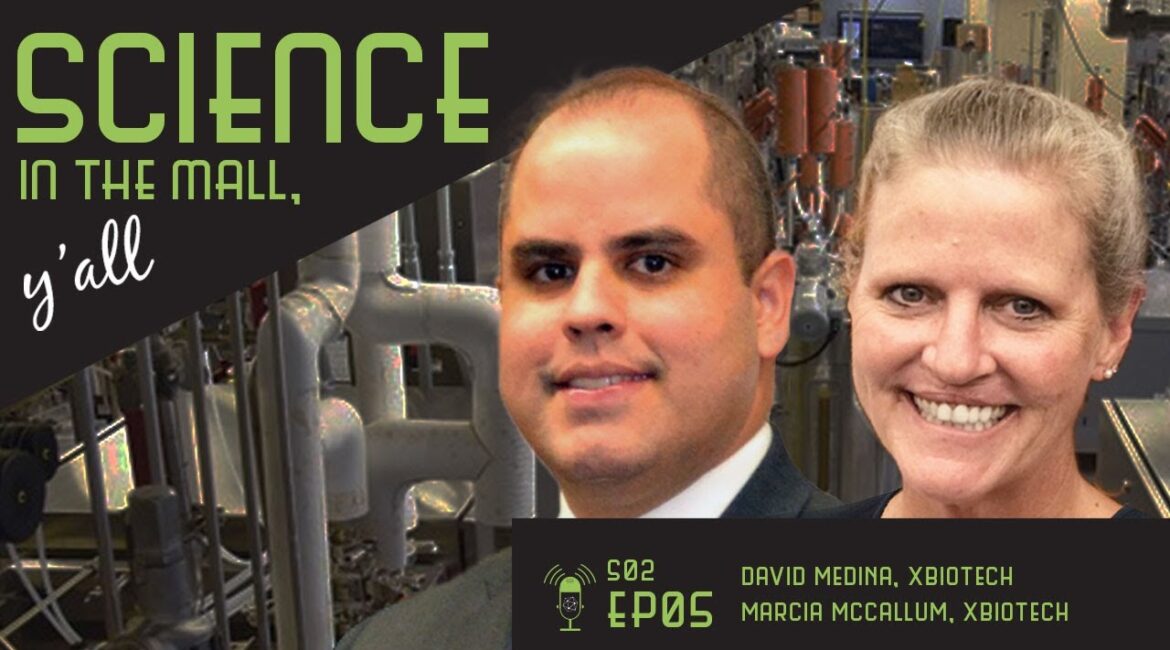[featured-video-plus width=770]



What you’ll hear in this episode:
- A discussion of monoclonal antibodies and how they’re used to make medicine
- What “upstream processing” involves
- Why hiring managers are starting to look beyond candidates’ credentials and certifications
- The importance of a good attitude and a learning mindset in school and beyond
What the heck are human monoclonal antibodies? And how in the world do you make medications from them? This is a question that XBiotech’s Marcia McCallum and David Medina answer in this week’s episode of Science in the Mall, Y’all. David is the Upstream Processing Manager and Marcia works under him as the Senior Lead in Upstream Processing, and their focus at XBiotech is the manufacture of medications from human monoclonal antibodies.
Human monoclonal antibodies (mAbs) are proteins that are produced by a single clone of cells or a single cell line. They’re used to bind to specific antigens in order to neutralize them or mark them for destruction.
Medicines that are made from human monoclonal antibodies are used to treat a variety of conditions, including cancer, autoimmune disorders, and infections. These medicines work by binding to the specific antigens that are responsible for causing disease. By binding to these antigens, the medicine can either neutralize them or mark them for destruction
If that sounds like gibberish to you, rest easy. For David and Marcia, it’s just another day’s work. Their work in upstream processing is the part of the manufacturing process that occurs before the actual medication is made. In upstream processing, cells are grown and cultured in order to produce the proteins and mass-produce cell culture with the antibody cells that will be used in the medication, before sending it “downstream” for purification and production.
The work is quite technical and takes a great amount of precision and attention to detail, but that doesn’t mean there isn’t room for learning from failure and mistakes in the lab. And they even have fun along the way.
Finding the right person for each job is a critical component to having the right mix and creating a good dynamic in the lab. And that means sometimes expanding your scope of requirements for applicants.
As a hiring manager, David knows that while credentials, knowledge, and skills are important, they don’t give the whole picture of a candidate. Skills and knowledge can be taught and trained. What’s really crucial is having a good attitude, a strong work ethic, and the desire to learn every day. So if, as a hiring manager, you overlook applicants who don’t tick every box of your requirements, you might pass over someone who would be a perfect fit.
Having both come from unconventional educational backgrounds, both David and Marcia know the value of not just education, but those other qualities. In fact, they credit their own passions in bioscience and having a willing, positive attitude as what helped them land their current positions at XBiotech — something students looking to enter the workforce as lab scientists should bear in mind. Hiring managers are increasingly realizing this and casting wider nets for applicants.
Remember, it never hurts to apply for jobs, even if you don’t meet all the requirements. Because the biosciences, like other scientific disciplines, are really all about growth and discovery, not just of monoclonal antibodies, but of the scientists themselves.
One of the things that Marcia and David love most about their roles in upstream processing at XBiotech is the fact that they get to learn every day. And that’s something that students can do before entering the workforce. In their lab courses and internships, students can augment their learning experiences to make the most of their education. This is a habit that will serve them well as they progress through their careers.
So, even if you don’t have a traditional academic background, there are still ways to learn and grow in the field of biosciences. All it takes is a positive attitude and a willingness to learn every day. Who knows, maybe one day you’ll be the one doing the hiring!
Listen to the full episode to learn more about ACC’s Bioscience Incubator, XBiotech’s work in monoclonal antibody medicines, and how skills matter, but attitude is everything!
Learn more about ACC Bioscience Incubator
Learn more about XBiotech.
If you liked the episode, don’t forget to like, subscribe, and share it with a friend!
Science In the Mall, Y’all is a founding_media podcast created in partnership with the ACC Bioscience Incubator.
Host: Dan Dillard, founding_media
Guests: Nancy Lyon, ACC Bioscience Incubator Director
Marcia McCallum, XBiotech, Senior Lead in Upstream Processing
David Medina, XBiotech, Upstream Processing Manager




